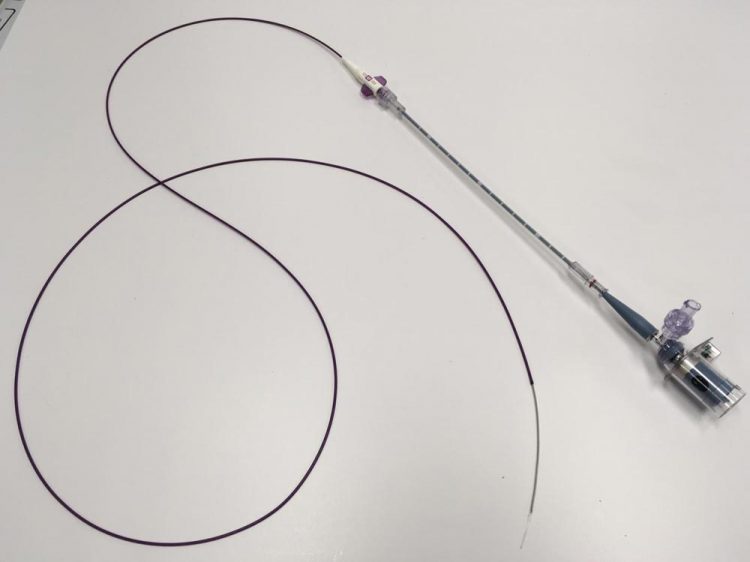New cardiac catheter combines light and ultrasound to measure plaques

Biomedical engineers at UC Davis have combined intravascular ultrasound with fluorescence lifetime imaging in a single catheter probe that can image the tiny arteries of a living heart. The new catheter can simultaneously retrieve structural and biochemical information about arterial plaque that could more reliably predict heart attacks. Credit: Marcu Lab/UC Davis
Professor Laura Marcu's lab in the Department of Biomedical Engineering at UC Davis has now combined intravascular ultrasound with fluorescence lifetime imaging (FLIm) in a single catheter probe that can image the tiny arteries of a living heart.
The new catheter can simultaneously retrieve structural and biochemical information about arterial plaque that could more reliably predict heart attacks.
The new device is described in a recent paper published in Scientific Reports.
An optical fiber in the catheter sends short laser pulses into surrounding tissue, which fluoresces with tiny flashes of light in return. Different kinds of tissue (collagen, proteins, lipids) emit different amounts of fluorescence.
At the same time, an ultrasound probe in the catheter records structural information about the blood vessel.
Seeking FDA Approval for Human Trials
The combination FLIm-IVUS imaging catheter provides a comprehensive insight into how atherosclerotic plaque forms, aiding diagnosis and providing a way to measure how plaques shrink in response to therapy.
The new catheter has been tested in living swine hearts and samples of human coronary arteries.
The catheter used in the study is flexible enough to access coronary arteries in a living human following standard procedures. It does not require any injected fluorescent tracers or any special modification of the catheterization procedures.
The new technique could not only can improve understanding of mechanisms behind plaque rupture – an event with fatal consequences- but also the diagnosis and treatment of patients with heart disease.
Marcu's group is currently working to obtain FDA approval to test this new intravascular technology on human patients.
Media Contact
All latest news from the category: Medical Engineering
The development of medical equipment, products and technical procedures is characterized by high research and development costs in a variety of fields related to the study of human medicine.
innovations-report provides informative and stimulating reports and articles on topics ranging from imaging processes, cell and tissue techniques, optical techniques, implants, orthopedic aids, clinical and medical office equipment, dialysis systems and x-ray/radiation monitoring devices to endoscopy, ultrasound, surgical techniques, and dental materials.
Newest articles

Superradiant atoms could push the boundaries of how precisely time can be measured
Superradiant atoms can help us measure time more precisely than ever. In a new study, researchers from the University of Copenhagen present a new method for measuring the time interval,…

Ion thermoelectric conversion devices for near room temperature
The electrode sheet of the thermoelectric device consists of ionic hydrogel, which is sandwiched between the electrodes to form, and the Prussian blue on the electrode undergoes a redox reaction…

Zap Energy achieves 37-million-degree temperatures in a compact device
New publication reports record electron temperatures for a small-scale, sheared-flow-stabilized Z-pinch fusion device. In the nine decades since humans first produced fusion reactions, only a few fusion technologies have demonstrated…





















